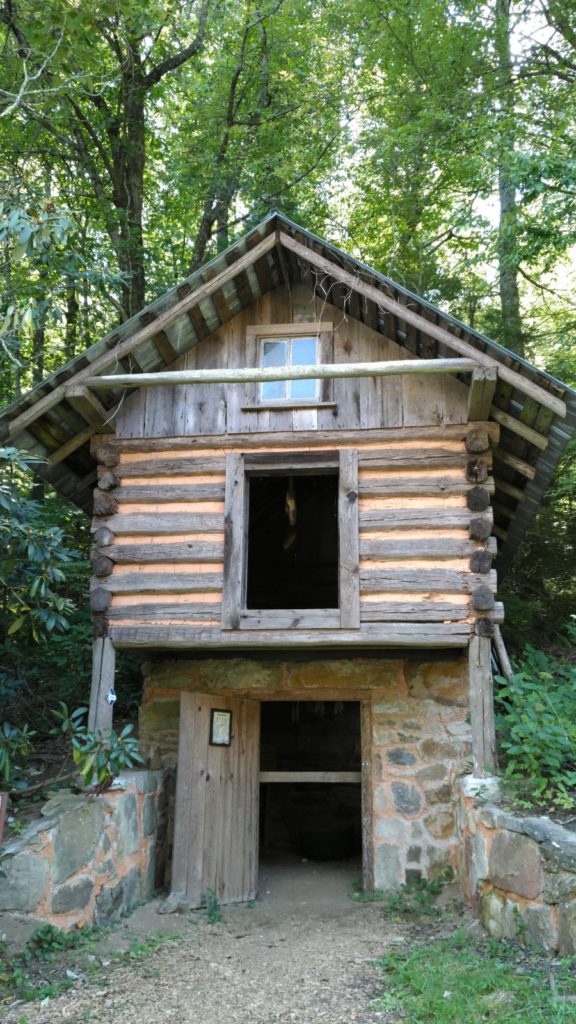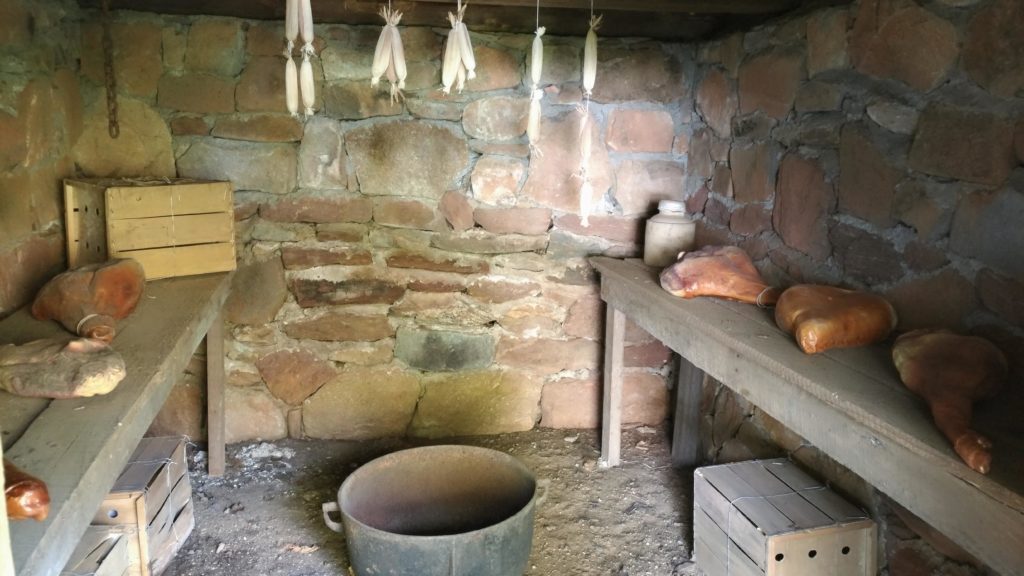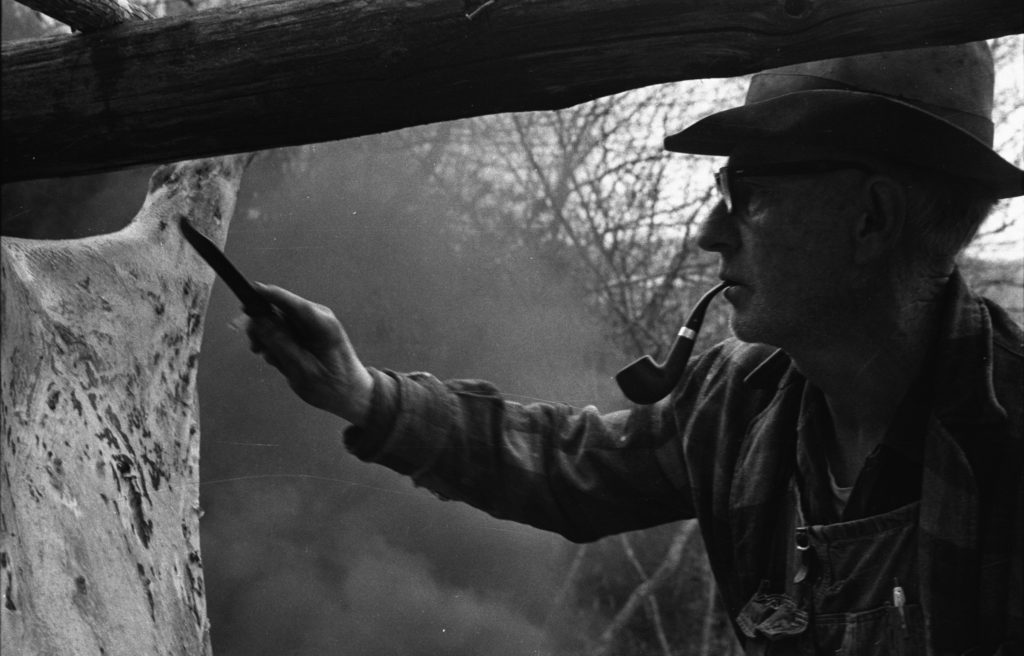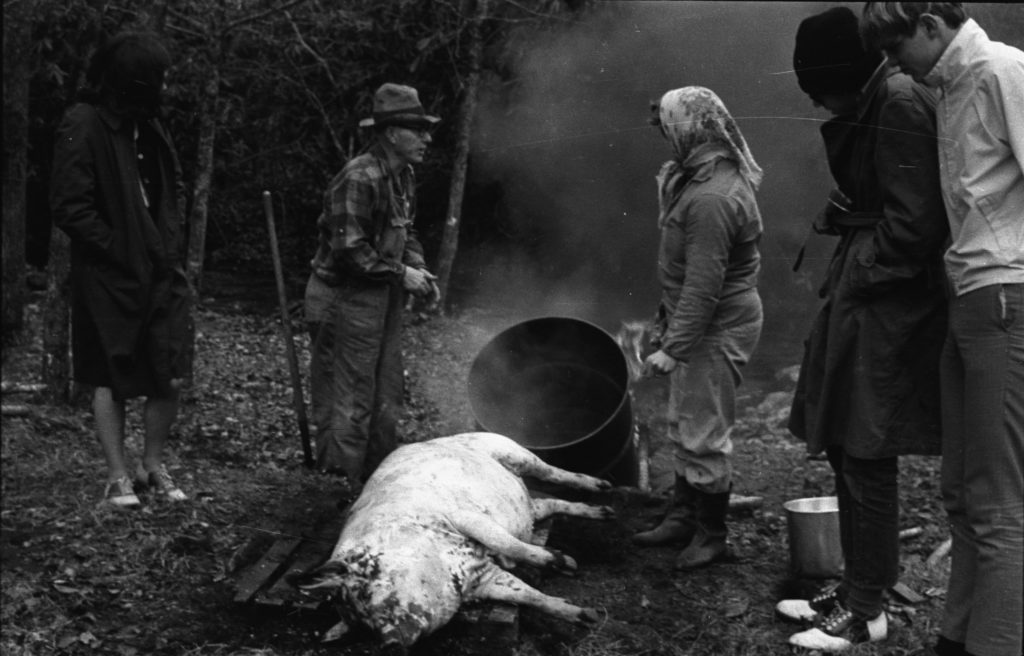This month’s episode features interviews on curing and smoking meat–and how climate change has impacted this important part of Southern Appalachian foodways. Released as a companion episode to the newly-revised edition of the Foxfire Book of Appalachian Cookery, this episode includes interview excerpts from Foxfire contacts Buck Carver, Sallie Beaty, J.C. Stubblefield, Carl Rogers, and Icie Rickman.

The smokehouse at Foxfire.

Inside the smokehouse at Foxfire. Curing meat was spread out on benches or packed in boxes with salt. Sausages were wrapped in cornshucks and hung from the rafters. Fires were built in iron kettles or on the ground.
Want to learn more about heritage breeds of pork? Check out the Livestock Conservancy or read about Ossabaw Island Hogs here.
If you’re interested in curing meat, or learning more about the process, check out Chapter 5 of the Foxfire Book of Appalachian Cookery or visit the National Center for Home Food Preservation.

Hobe Beasley butchering a hog.

Foxfire students learning how to scald a hog, before butchering.
In Appalachia, cured meat was commonly eaten by itself (after it was boiled to rehydrate it), or added to vegetable dishes for a more robust meal. No bean dish was prepared without a slice of salt pork. From Granny Gibson: “Green beans are the best in an old black pot. I just put them in a pot with some water and some grease or a piece of pork and cook them three or four hours—not all day. I usually have them for dinner on Sundays.” Salt pork is also a great addition to soups and stews, and imparts a lot of flavor from smaller portions of meat.
Transcriptions for audio excerpts:
Intro (Buck Carver):
- “I’d raise Cain with the old lady if we didn’t have meat on the table three times a day. It’s still that way with me, it seems like when you ain’t got some meat on the table, you just ain’t got nothin’.”
Structure:
- JC Stubblefield:
- Foxfire: “Let’s see, Uncle Jay, why don’t we do that one right there? What’s that one?”
- JC: “We built that for smokehouse, way back then, when we was killin’ a hog, we’d put our meat up there to cure in the winter time, you know.”
- Foxfire: “Okay, and what’s it made out of?”
- JC: “It’s made out of oak lumber, is what it’s made out of.”
- Foxfire: “Oak lumber?”
- JC: “Oak lumber.”
- Foxfire: “And it’s got a tin roof?”
- JC: “Tin roof.”
- Foxfire: “And how big would you say it is?”
- JC: “That’s a–I believe that was 7 by 8, I believe, is what I made it. Seven foot by 8 foot. I think that’s what that is.”
- Foxfire: “And what’s it sittin’ up on? Big rocks?”
- JC: “It sets on, it’s settin’ on big rocks. I had plenty of rocks and I just used rocks. Back then they didn’t know what a block was.”
- Foxfire: “About how old would you say it is?”
- JC: “Well I’d say, it must’ve been at least 40 years old. It may be older.”
- Foxfire: “Did you have it when you were young or did you build it?”
- JC: “No, I built it myself. It may be, I don’t know–I built it myself.”
- Foxfire: “And what kinds of things did you used to put in it when it was the smokehouse?”
- JC: “Meat–pork.”
- Foxfire: “Just pork?”
- JC: “Just pork.”
- Foxfire: “Did you have cattle then too?:
- JC: “We had cattle but we didn’t kill much meat.”
- Mrs. Stubblefield: “I’m gonna leave, I got somethin’ on the cooker and I smell it.”
- JC: “Burnin’ up.”
- Foxfire: “Burnin’ your supper up again.:
- JC: “Now, where’d I get to?”
- Foxfire: “Tellin’ me that you didn’t have, you didn’t have cattle, or you did have but you didn’t kill ‘em?”
- JC: “We didn’t kill ‘em then, but later we did. But we didn’t use that to put ‘em in.”
- “We killed a beef, it was cold enough in the wintertime, just hang it on the back porch. When you wanted some, go out there and cut you off what you want.”
- Foxfire: “And it was, what was it?”
- JC: “Beef.”
- Foxfire: “And it was just hanging there?”
- JC: “Just hanging there.”
- Foxfire: “Okay.”
- JC: “Back then, you could do that. But you can’t do that now.”
- Foxfire: “It’s not cold enough anymore?”
- JC: “It’s not cold enough. Without any cold weather now, you know, it’ll be two or three days maybe it’s cold, you have so many warm days. And that’s when your meat will spoil, when it turns warm, it’ll spoil ‘em.”
Curing meat:
- Buck Carver
- Foxfire: “How’d you smoke your meat?”
- BC: “I used hickory wood. And I worked with the Dillards several years over there, and back when they grew and slaughtered, cured their own meat, they used apple tree wood mostly to smoke their meat with. And they, the Morton sugar cure salt was, is pretty expensive, and they tried to be pretty conservative–you tend to have to, I guess, in order to make the money to make end’s meet. They would buy a five-pound sack of sugar, a five-pound sack of salt and mix it equal, fifty percent of one and fifty percent of the other. They used that to cure their meat with. And they’d pack it down tight in boxes. They called it picklin’ it in its own juice. They packed them boxes for, I believe, about three weeks if I remember. Garrison helped me fix one of mine over there, one time I left it in their cooler for, I believe it was three weeks. But the way I used to cure this by the Morton smoke cure with salt, and on the benches of the smokehouse, spread them out on them boards. That’s for the skin part of the meat to lay on, you know. Simply pour it on the rest of it.”
- Foxfire: “Rub it in?”
- BC: “Rub it in with your hands, that’s right. And you take, now just pure salt, it probably possible to get too much if, but when you use that prepared preparation, there ain’t no danger of putting too much on. And let that stay on there for, oh, November, December ‘til the end of February. Scrape it off. Your smokehouse should have, and if it ain’t got it, it should have, an earth floor in it. Set your big old-timey dishpan or something like that right in the center of the room, hang your meat up on the nails and the rafters overhead and along the walls too. If you’ve got it hanging out from these rafters, smoke can get all over and in and around it.”
- Foxfire: “Did you have it in a pot or anything? Did you have your fire in a pot?”
- BC: “Had an old discarded dishpan. Where you got an earthen floor, you can, if you don’t mind gettin’ your dirt floor messy, you can just build it on the ground. You didn’t no blaze a’tall hardly, if you could help it.”
- Foxfire: “Yeah. How long does it take to smoke it?”
- BC: “Well, a week or ten days would do, but I like to be sure, so I always smoke mine about three weeks.”
- Sallie Beaty:
- SB: “Our meat, we cured it out in a smokehouse that was just a house with a dirt floor, no ceilin’ or nothin’, and we had a, strips of wood across there that we hung it up on, or shelves that we left the meat a-layin’ on. They cured beef the same way–dried out our beef instead of…”
- Foxfire: “How long did it take to cure out?”
- SB: “About two months, I guess, it would take. Six to eight weeks for it take salt and everything.”
- Foxfire: “How did you salt cure it? I mean, didn’t you salt cure it before you put it in there?”
- SB: “Uh, back then they used mostly just plain salt with red pepper and black pepper in it. And rubbed it on our meat, on both sides, and then put it out on the shelf and put corncobs between each layer. Sometimes they would make it like three layers high. And then they would go back, in like a week or two weeks, and turn it over so all the water that had drained in there now that was settlin’ would run out. Some people would wrap the hams and shoulders, wrap ‘em when they put the salt on it, up in brown paper and hang it up in sacks. And always hang their leg down so it would always drain out through it.”
Climate:
- Carl Rogers
- Foxfire: “What was your favorite food?”
- CR: “Meat. We just cured it up back then. Can’t cure it anymore. Just too hot. We’d cure meat and everything else. It’d keep.”
- Foxfire: “Did you ever smoke any?”
- CR: “Yeah. Yeah, we took a lot of our hog meat–I don’t know whether they smoked any of the beef or not–but they’d smoke the hog meat most of the time.”
- “What would you eat for Sunday dinner?”
- CR: “Usually chicken. Have chicken and dumplings on Sunday. Things we’d eat were beans and taters, meat and everything else–just whatever they could. But if you didn’t raise it back then, what you didn’t eat, you didn’t have it.”
- Foxfire: “Did your mother do all the cook or some girls to help, or would you all help? Or what?”
- CR: “Well, mother done the most of it, but my sisters used to help her a lot, whenever–I had two half-sisters and as long as they was home, they would help her though. And all of us would help her too. Whenever they’d be gone, just any of us there to help her out if she needed any help.”
- Foxfire: “Who did the butchering?”
- CR: “My dad. He done all of it. Once we got big enough to do it ourselves, and now, we had to do it. He turned it over to us. I reckon there ain’t nothin’ I’ve found about cuttin’ and butcherin’ now if I had to.”
- Buck Carver:
- “It’s necessary, it has to be in cool weather or you gotta have a cooler or somethin’ to put that in. In summertime and springtime, the weather’s always too dog-gone warm. Now in the fall of the year, when it is hog-killin’ time, if you have two or three weeks of rainy weather, it’s sure rough on that meat. I’ve had many a piece of it had to be thrown away on account of atmospheric, bein’ too damp and too warm, lots of meat lost on that account.”
- Icie Rickman
- “You see that log house out there? That’s their smokehouse. They had big old boxes and they’d put it in it, cure it.”
- Foxfire: “Can you remember, you know when it was time to kill hogs and everything, what happened at your home when you all did that?”
- IR: “We killed ‘em all in November. They’d go by the moon. They had a certain time of the moon they killed hogs. Back then, lots of folks do different then than they do know, they’d go in, people’d go and help them you know. Their neighbors would go and help them kill hogs. Help one another. And then they killed ‘em and salt ‘em down in the box. They had a big ol’ long box, like. Cure ‘em. But you can’t do meat like that anymore, i’ve tried it. I don’t know, it’s just the season. ‘Cause I have a hog, and I have to freeze mine. You can’t do it that way anymore, I don’t know why.”
- Foxfire: “You mean they just won’t cure?”
- IR: “No, they just, it’s just the season I reckon. You know, it’s just the season’s short and it’s just not cold enough to keep it.”